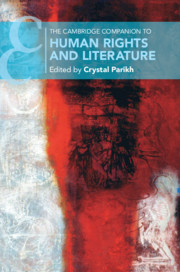Book contents
- The Cambridge Companion to Human Rights and Literature
- The Cambridge Companion to Human Rights and Literature
- Copyright page
- Epigraph
- Contents
- Notes on Contributors
- Chronology of Major Works and Events, 1215–2018
- Introduction
- Part I Genealogies and Contexts
- Part II Fashioning Methods
- 5 Law and Literature, the Procedural and the Performative
- 6 Human Rights Modes and Media
- 7 Remembering the Forgetting
- 8 Queering Human Rights
- Part III Generic Representations
- Part IV Writing Human Rights
- Select Bibliography
- Index
- Cambridge Companions To …
5 - Law and Literature, the Procedural and the Performative
from Part II - Fashioning Methods
Published online by Cambridge University Press: 24 June 2019
- The Cambridge Companion to Human Rights and Literature
- The Cambridge Companion to Human Rights and Literature
- Copyright page
- Epigraph
- Contents
- Notes on Contributors
- Chronology of Major Works and Events, 1215–2018
- Introduction
- Part I Genealogies and Contexts
- Part II Fashioning Methods
- 5 Law and Literature, the Procedural and the Performative
- 6 Human Rights Modes and Media
- 7 Remembering the Forgetting
- 8 Queering Human Rights
- Part III Generic Representations
- Part IV Writing Human Rights
- Select Bibliography
- Index
- Cambridge Companions To …
Summary
This chapter looks at two nexuses: law-and-literature and human-rights-and-literature. In her analysis of Charles Reznikoff’s book-length poem Testimony: the United States (1885-1915): Recitative (1978), the author brings the law-and-literature paradigm to bear on literary expression of human rights. She finds in the text overlapping ideations of the procedural and the performative, in its juridical and literary dimensions. On the one hand, the text serves to show the limitations of the law and its technologies such as the trial, which literary performance can help compensate for. On the other hand, Reznikoff's poem also proves the necessity for these technologies as organizing principles, especially in methods like citation and precedent, in order to battle the ever present risk of erasure.
- Type
- Chapter
- Information
- The Cambridge Companion to Human Rights and Literature , pp. 75 - 87Publisher: Cambridge University PressPrint publication year: 2019

